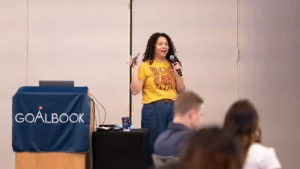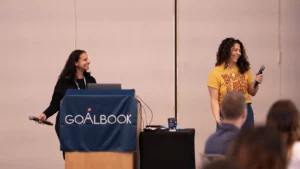If you’re looking for a role with an EdTech company, you may see job titles and descriptions that feel similar to others but sound different in the way they’re written. Additionally, if you have a background in education, you may see a certain job title and think, “I did that every day.”
However, if you’re new to EdTech roles and responsibilities, you’ll quickly learn that companies can talk about similar roles differently, and that not every job in EdTech is what you first think.
To help you navigate this complexity, we compiled roles and responsibilities from a variety of EdTech companies (including our own) to help clarify what you can generally expect from common types of roles.
We hope this overview helps you gain clarity on the major roles and responsibilities in EdTech so you can better understand which role(s) may suit you best.
Customer-Facing Roles
To begin, let’s look at the types of roles that engage with both prospective and existing customers. While many roles can be classified as customer-facing, we’ve identified three main categories: sales, customer success, and professional development.
- Sales
EdTech sales are all about forming relationships with school- and district-level decision-makers through virtual or in-person meetings to identify a problem that can be solved by purchasing the company’s product or service.
Different EdTech companies use different titles for their sales team members, so other sales-related titles you may see include: account executive, partnerships representative, field representative, sales director, and sales representative. Take note that when a sales role is called “partnerships” or “partners,” it is not necessarily working with community members; rather, it will likely be establishing relationships (i.e., partnerships) with decision-makers in districts.
You may enjoy a sales role if you can navigate complex discussions, build relationships with a diverse set of people, are organized and detail-oriented, or have an entrepreneurial spirit. Also, sales roles typically include travel as a requirement, so be sure to check the estimated travel time listed on the job description before you apply to ensure the travel requirements work with your lifestyle.
Nick Simon is in a District Partnerships role at Goalbook. Before joining Goalbook, Nick taught U.S. History and U.S. Government at the high school level. “Most of what I do in my sales role is making personal connections and building relationships,” said Nick. “If you have skills around building relationships with people, and if you want a way to still help educators out, sales could be for you because that’s how I view what I do.” Click here to read more about Nick’s transition to EdTech, including his advice for job seekers.
- Customer Success
Customer Success roles are relationship-focused positions that specialize in working with customers (school or district administrators) to ensure they have a positive experience with the company’s products and services. Additionally, in some EdTech companies, the customer success role works on sales renewals for existing customers.
This role may provide customer training and support of the product. As a result of working closely with customers, a person in this role may collect, leverage, and analyze customer usage data to maximize customer engagement and usage. This role seeks to understand and improve the customer experience and lifecycle to ensure customers have effective implementations and achieve their desired goals.
Sohum Bhatt is a District and School Customer Success Manager at Goalbook. He was a client service manager at a healthcare SaaS company before teaching high school chemistry for seven years. Sohum stumbled across a blog from a former teacher who wrote about the different types of customer success roles that exist in the private sector. Sohum said, “I realized that customer success in EdTech was similar to what I had done in my client services job, but in an industry I cared more about.”
Like Sohum, you may also enjoy a customer success role if you like building relationships, interacting with school or district administrators, and data analysis. You can read more about Sohum’s transition from the classroom to EdTech by clicking here.
- Professional Development
Similar to customer success, the professional development role often provides ongoing, virtual or in-person support and data analysis. However, a key differentiator between customer success and professional development is that in the latter, the person is in a content development and delivery role.
The professional development role will be focused on creating training content and teaching users how to use the company’s product. This role uses market feedback, product evolution, research, and input from stakeholders to guide and update professional development and training courses.
For example, a person in a professional development role may create a series of courses around a topic so the company can offer those courses to customers. The types of courses may include the development of a new skill, staying up to date on trends in pedagogy, or career advancement.
You may enjoy a professional development role if you: like developing curriculum and learning experiences for adult learners, try to stay up to date with the latest and best instructional strategies, and are a high-level thinker who can create and deliver engaging courses.
Content Development (Curriculum Development) Roles
If you love creating and planning curricula or learning experiences for learners, a job in content may be for you. In the EdTech sector, there is a difference between curriculum development, content design, and instructional design, so let’s take a quick look at each of these roles and then learn a helpful hint to understand the main difference between them.
- Curriculum Development
A curriculum developer will create new — or update existing curricula — to improve student learning outcomes. This role may work with school districts or states on creating curricula that align with specific state standards and guidelines. If you are interested in a curriculum development role, be sure to research if the company has student-facing, teacher-facing, or student- and teacher-facing products because this will influence what kind of curriculum is created.
- Content Design
One function of content design is creating the original subject matter that goes into a course or curriculum. This is another title that may vary depending on the company and the type of product they produce, so it’s important to do your research before applying to a content design position.
- Instructional Design
Instructional design is an interdisciplinary field that draws on science, human-computer interaction, educational psychology, systems theory, and more. An instructional designer considers how educational tools should be designed, created, and delivered to learners (both children and adults). Some skills required for this position are: applying theory and learning science; data analysis; writing clear copy/scripts/storyboards; layout design; and communicating with stakeholders.
It’s worth noting that instructional design is not a lateral move from the classroom to the private sector. Instructional design is not the same as lesson planning or using Understanding by Design to plan a unit.
If an instructional design role interests you, you may need to acquire some additional skills before applying. One possible path to getting the skills and knowledge base this role needs is to look into courses that are either free or inexpensive on LinkedIn Learning, YouTube, or Coursera.
Helpful Hint:
Here’s one way to think about the differences between Curriculum Development and Instructional Design:
- Curriculum Development is about creating educational courses and focusing on what students will learn and what can be improved.
- Instructional Design focuses on how students will learn, the course plans, and the learning process and how to improve them.
Other similar job titles related to Content Development are: content contributor, content specialist, content analyst, and content developer.
Amanda Walker is a Specialized Instruction Analyst at Goalbook. In her role, Amanda creates and reviews content, manages projects, and serves as an analyst. This involves examining data and metrics to inform future work. “I look at data and metrics to help inform future work and determine things like whether I should make adjustments to the quality of the product or the project itself,” said Amanda. Click here to learn more about Amanda’s role in Content and what her day-to-day looks like.
Marketing Roles
Marketing is the action a company takes to attract an audience to their products and services. Marketing roles primarily focus on using words, graphics, images, or videos to provide relevant information to existing customers and prospective customers so they can learn about a product and make informed decisions. Marketing embodies a wide variety of different domains, such as digital advertising, content marketing, email marketing, web design, and product marketing to name a few.
If you have a background teaching or studying psychology, art, history, English, or other subjects in the humanities, a marketing role may be a good option for you because the skills and knowledge you taught or studied can often be applied directly to marketing work.
As a personal example, I am a former English teacher, and Goalbook hired me as their first full-time marketing writer. I knew marketing for an EdTech company was right for me because I could combine my passions for education and writing into one role. My manager, Patrick, said my teaching experience and how authentically I could talk about Goalbook’s products and professional development were reasons I was a good fit for this position.
A benefit of coming from education to working in marketing for an EdTech company is that you have likely been the target audience for the company’s products, and you know about teachers and administrators, so you can relate authentically to the educator experience.
Human Resources Roles
Just as in any other organization, human resource roles in EdTech take care of employees and employee-related matters. Human Resources encompasses administrative work in addition to recruiting, hiring, creating policies, and training of personnel. Alternative titles you may see for Human Resources are: talent acquisition, talent management, or people operations. You may enjoy a role in Human Resources if you enjoy solving problems, building career paths, and supporting others to boost engagement and productivity.
- Learning and Development
A learning and development role is often part of the Human Resources department. This role empowers employees by helping them develop specific skills, knowledge, and competencies to perform better at work. Learning and development specialists assess employees’ needs and propose solutions to meet those needs through professional development, setting up training, and creating training materials.
You may enjoy this role if you’re passionate about helping people learn and grow. Other skills needed include a knowledge and understanding of adult learning, curriculum development, and problem-solving skills.
- Sourcer
A sourcer searches for potential job candidates that have not actively applied to a role through a job board or a corporate website. The sourcer assesses and engages with potential candidates to create interest in the company and hopefully turn them into applicants. A great sourcer knows how to do market research before even starting the search and can use many tools, such as LinkedIn, to find the best talent.
- Recruiter
Like a sourcer, a recruiter can do passive sourcing, strategic sourcing, and sourcing via an Applicant Tracking System (ATS) to know how to identify and then qualify potential candidates. They run operations and logistics in the interview process (from screening, selection, and hiring) to ensure it runs smoothly. Recruiters work to build relationships and create a great candidate experience; they are the expert liaison between candidates and the hiring team. They also advise on job descriptions, interview questions, compensation, and interview compliance, among many other things.
Since not all companies have a sourcer for a recruiter to partner with, being a “full cycle recruiter” can be a valuable skill set. “Full cycle” means a recruiter is able to execute the recruiting process from start to finish.
Goalbook recruiters Purva and Veronica both taught for Teach for America (TFA) before moving into teacher-recruiter roles. Purva recruited for a teacher residency program, while Veronica recruited for TFA. These experiences developed skills necessary for recruiting and prepared them to pivot their careers into EdTech.
Because they were both teachers, Purva and Veronica are in a unique position to understand the skillset of educators and how it’s transferable to other roles outside of education. They feel empowered to be advocates for educators and Goalbook at the same time.
You may like a role as a sourcer or recruiter if you have strong written and verbal communication skills, you’re extremely organized, and you’re able to manage multiple, competing priorities and projects simultaneously. In addition, you may also enjoy these roles if you enjoy building authentic relationships and listening to others.
Part-Time Contractors/Contributors
If you are curious about transitioning to the private sector but aren’t ready to dive into a full-time role, part-time work in EdTech can be an appealing entry point. Part-time roles often have a specific duration of time, whether that be a few weeks or a few months, because these roles often include project-based work, contract positions, or “as-needed” support.
This path might make sense for you for the following reasons:
- Flexibility. Part-time roles often allow you to work around your existing schedule. This is especially helpful for educators still in the classroom or juggling multiple responsibilities. The work is often self-directed, and many of the roles are remote.
- Gain perspective. You get a window into how EdTech companies operate. It’s a way to test the waters before making a bigger career leap.
- Skills alignment. Many of these roles tap directly into your expertise — whether that’s instructional design, training and support, or content development.
There are some things to keep in mind about part-time work:
- The work may not be consistent. Some part-time roles are project-based with a clear start and end date. Others may operate on an “as-needed” basis — think substitute-style scheduling for virtual facilitators or seasonal surges during back-to-school. There may be times when you are very busy and others when you have very little to do.
- Benefits are rare. Health insurance, retirement plans, or paid time off typically don’t come with part-time roles, so it’s worth considering how this fits into your bigger picture.
- Communication expectations vary. Even if it’s part-time, some teams expect rapid response times or specific hours. It’s important to clarify expectations up front.
- You are not guaranteed a full-time role with the company. Your success in the role does not guarantee the possibility of permanent, full-time employment.
Some part-time roles in EdTech include: curriculum writer, instructional coach (contractor), professional learning specialist, content reviewer or editor, and assessment scorer.
For many folks with a background in education, part-time roles offer a way to build confidence, gain private-sector experience, and expand your professional network while keeping your values and skill set intact.
If you’re new to the EdTech space, it’s easy to feel confused by different descriptions or like multiple roles are calling your name. Knowing some of the roles in EdTech can help you narrow down your focus and job search so that you are applying for roles that you are not only qualified for, but that also play to your strengths and greatest career interests.
For more information on how to prepare to apply to EdTech jobs, check out our post “How to Prepare for Your EdTech Job Application Journey — Insights and Suggestions from an EdTech Recruiter.”
Article updated on May 21, 2025
Explore Goalbook’s open jobs on our Careers Page.
Follow us on LinkedIn to stay up to date on job opportunities.







